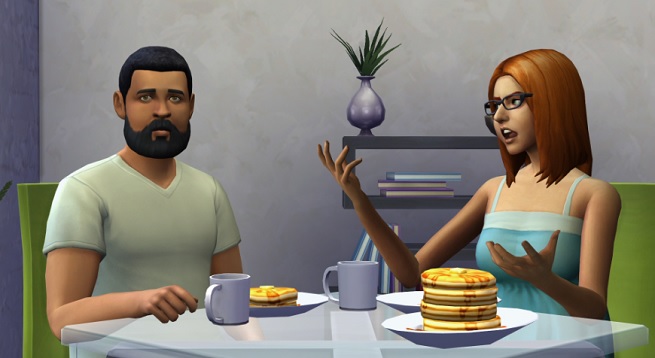GamesBeat: There’s this Internet culture thing that invades quite often, too, where sexist and racist attitudes show up in multiplayer games. You’re listening to chatter and people go out of their way to talk like that on purpose.
Pearson: Just to stir up trouble, yeah.
GamesBeat: Sarkeesian got all kinds of death threats for saying what she said. If you’re the parent of someone who is going to be in the middle of that stuff, you don’t wish that on them, or on anyone. It seems like there’s something wrong here that has to be fixed. I don’t know exactly what is going to solve those different kinds of problems.
Pearson: We talked about it a bit earlier. It’s a bit of a chicken and egg problem, on both sides. You need to encourage women to be a bigger part of the industry and a bigger part of games. Those complement each other. The more women that are interested in games, the more will be interested in making them. The more women come into making games, the more they’ll influence games.
We need to come at it from both sides. We need to keep pushing our games to be appealing to both men and women and understand that people of any gender will play a game if it’s compelling, if it offers something new and different for them. In the industry, we want to keep encouraging women to join dev teams and engineering teams and PR teams, because they can influence the types of games that are out there and change them from the inside.
Unfortunately, it’s going to take a while. It’s not like you can run out and hire a bunch of people and change games right away. It’s a slow process. I see encouraging things happening, just as much as I see the really harsh realities that are still out there. I happen to be a very optimistic person. It’s probably why I love The Sims. I feel like we’re still moving the way that we should. Any time we get the opportunity, we should continue to push it and encourage breaking down those limits and making a better gaming experience that appeals to everyone, and a better industry to be a part of.
GamesBeat: There also seems to be more diversity of viewpoints among women in the industry, like women in eSports, who seem to be perfectly at ease and at home beating men in games that tend to be dominated by men. It seems like there are a lot of points of view that you can have.
Pearson: A lot of that just comes down to individual personalities and individual approaches to the types of games that they enjoy, or the types of competition they’re willing to be a part of. There are differences like that between people all over the place. Plenty of men I know are super uncomfortable with aggressive eSports, because they don’t like losing. [Laughs]
I think it has a lot more to do with finding the game you like and being passionate about it and being part of that culture, regardless of your gender. Hopefully that culture is willing to accept that. I think we are seeing more of that. Like you said, a lot of women are doing fine in eSports. I’ve seen lots of women in MMO guilds that do well. It’s out there.
More and more, we’re getting the recognition that the gaming audience is broadening – that a lot more women are involved, and they’re just as engaged as anyone else. That’s great. I hope that continues to be the case. Games really are for everyone. Everyone likes different stuff.
GamesBeat: Game design itself can be interesting as far as affecting change. Robin Hunicke was suggesting this feeling-focused game, where you think about the kind of emotional state you want to create in the gamer and then work back from there to design your game. You wind up with things like Journey, which she produced, if you take that approach. I would think that you would also wind up with games that a broader group of people like.
Pearson: That’s an interesting way to think about it. With The Sims, we think of it in terms of stories. What stories do we want to let people tell? But it’s very related to what she’s talking about.
Say I want someone to be able to tell the story of the sister and brother that got separated and found themselves back together. How do we do that? Then we approach the game design that way and say, “Oh, well, we would need to do this and the other thing.” We enable putting those pieces together in interesting ways.
The Sims has historically been used to tell all sorts of stories. With The Sims 3, we had the blogger that told a story about the dad and his daughter living homeless out in the world, how they dealt with that. It was called “The Story of Alice and Kev.” It was very heartfelt, a deep story that he was telling using the game as a tool. We didn’t sit in a room and specifically talk about how we could design features for that story, but the question was and is, how do we approach this to let you create feelings and connect with characters in a way that you might not get from something else?
Feeling is absolutely a part of it. Story is absolutely a part of it. Emotions and how a player connects to a character are part of it.
GamesBeat: You could build a sort of sandbox for making anything possible, but you could also create a directed story that carries a message with it.
Pearson: You could. The Sims is definitely more in the sandbox realm, because we want to let players put together a story on their own. It’s one of the things that’s most powerful about The Sims. But you can also give them those little hooks to push them down a particular path, to give them somewhere to start and see where it goes.
GamesBeat: Are there things you would still target that you feel like need progress, things that are facts of the game industry right now?
Pearson: That’s a big question. How would I fix the industry? Some of the things we’ve mentioned here — targeting more representation from women at conferences at talks, hearing from more women in development in the venues that people traditionally look at for gaming, that’s one way to make sure we’re surfacing that point of view. I would love to see more conversations about strong women as characters, and not because they’re women, but because they’re interesting characters.
I’d love to see more people find a way to open the conversation outside of their comfort zone, to encourage games or teams that feel like they’re more traditionally male to reach out to the women in their audiences and acknowledge that they’re there. They probably are. It’s a big challenge to tackle. I don’t have all the answers.
VentureBeat's mission is to be a digital town square for technical decision-makers to gain knowledge about transformative enterprise technology and transact. Learn More



